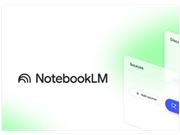Google has previously updated its AI-powered note-taking app, NotebookLM, introducing the "Audio Overview" feature. This allows users to engage in an AI-driven dialogue to discuss their notes, facilitated by two AI-generated hosts who use the context of your notes to explain complex topics, draw analogies, and maintain a continuous conversation with you.

Now, Meta is following suit, recently launching an open-source alternative to NotebookLM called NotebookLlama. It is a guided tutorial for generating podcasts from PDF files, aiming to guide users on how to convert PDF files into podcast format while learning how to use text-to-speech models. This article will detail the core features, highlights, applicable scenarios, and usage tutorial of NotebookLlama.
Introduction to NotebookLlama
NotebookLlama is an open-source project launched by Meta, comparable to Google's NotebookLM, offering a workflow from PDF to podcast. It covers the entire process from preprocessing PDFs to final podcast generation, including the use of different large language models (LLMs) and text-to-speech (TTS) models.

Highlights of NotebookLlama Features
- PDF Preprocessing: Use the Llama-3.2-1B-Instruct model to preprocess PDFs and save them as .txt files.
- Podcast Script Writing: Use the Llama-3.1-70B-Instruct model to write podcast scripts from text.
- Dramatic Rewrite: Use the Llama-3.1-8B-Instruct model to make the script more dramatic.
- Text-to-Speech Workflow: Use the parler-tts/parler-tts-mini-v1 and bark/suno models to generate conversational podcasts.
- Model Experimentation: Encourage users to try different models and prompts to find the best podcast generation results.
Applicable Scenarios
- Educational Content Sharing: Convert educational materials into podcasts for students to learn anytime, anywhere.
- News Reporting: Convert news articles into podcasts for busy listeners.
- E-book Reading: Convert e-book content into audiobooks to enhance reading diversity.
- Corporate Training Materials: Convert training documents into podcasts for employees to learn during commutes.
- Personal Blog: Convert personal blog posts into podcasts to expand the reach of the content.
NotebookLlama Usage Tutorial
- Preparation: Ensure you have a GPU server or API provider and access to Hugging Face tokens.
- Install Dependencies: Clone the NotebookLlama GitHub repository and install the required dependencies.
- Run Notebook 1: Update the PDF link in the first cell and process the PDF using the Llama-3.2-1B-Instruct model.
- Run Notebook 2: Convert the output from Notebook 1 into a podcast script using the Llama-3.1-70B-Instruct model.
- Run Notebook 3: Dramatically rewrite the script using the Llama-3.1-8B-Instruct model.
- Run Notebook 4: Convert the final script into a podcast using the parler-tts/parler-tts-mini-v1 and bark/suno models.
Conclusion
NotebookLlama is a powerful tool that not only helps you convert PDF content into podcasts but also allows you to learn how to use the latest AI technologies in the process. If you are interested in NotebookLlama, feel free to like, comment, and keep an eye on our updates as we explore the limitless possibilities of AI together.
NotebookLlama Project Address: https://github.com/meta-llama/llama-recipes/tree/main/recipes/quickstart/NotebookLlama






